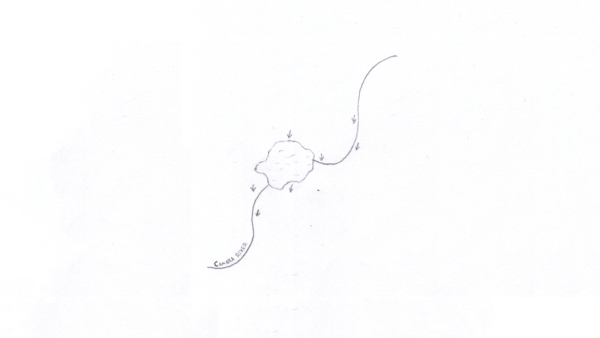Forests often shape the placements of cities and other elements on a world’s map. In this article, I’d like to cover a few styles of trees to help you with drawing forests on fantasy maps.
In the last months, I have been releasing a series of Art posts, about drawing maps. Today, I’d like to continue this little series with the third article, this time about trees and forests. If you are drawing a fantasy map, whether for your worldbuilding project, for a DnD campaign, or just for fun, this is the guide to read. I will go over six of the styles I use for the maps of my fantasy world, Eledris.
If this topic interests you, please feel free to check out all my other articles about maps, under the Map tag!
Style 1 – Forest as a whole
This is one of the easier, less tedious style to draw, as you create the whole forests, without drawing individual trees. It is heavily inspired by the amazing Pen & Blade. Basically, you sketch out where the forest will be, and you draw only the trees at the edge of the woods. If the forest is large in size, you can fill in a few trees sticking out on top.
Style 2 – Branching trees
The style of branching trees is one I have been doing since I was about 7. It’s simple, and it has a very specific look, so it might not be for everyone. However, I think it does look good, in certain maps.
With this style of drawing forests, you have to draw individual branches, as they rise from the tree’s trunk. Be sure to keep the branches reasonably varied. It’s also important to keep the branches growing up, not down, as illustrated below. If you don’t do this, the trees can become messy and unrealistic (because most trees grow their branches to the sky).
Style 3 – Shadow trees
This one is probably my least favorite style of the bunch, but I can see some people liking it, so I decided to include it anyways. This style of drawing fantasy trees for maps consist of simple shadows to represent the trees, such as this:
With this style, you can achieve spookiness in your maps. You can also variate the shapes of the shadows to make different kinds of trees.
Style 4 – Simple circle trees
One of the simplest styles of drawing forests, this style depicts individual trees as small circles with small lines for the trunks. While this style takes very little time to draw, the trees can lack variation.
If you want to, you can shade the trees to add a bit more detail.
[lgc_column grid=”50″ tablet_grid=”50″ mobile_grid=”100″ last=”false”]
[/lgc_column]
[lgc_column grid=”50″ tablet_grid=”50″ mobile_grid=”100″ last=”true”]
[/lgc_column]
Style 5 – Pine trees
This style is similar to the last one, in that the trees lack variation, thus can become a bit boring. However, I find it a bit more interesting and realistic than the simple circle trees. Draw little triangles with rounded corners as the trees. Same as the last one, shading can add details.
[lgc_column grid=”50″ tablet_grid=”50″ mobile_grid=”100″ last=”false”]
[/lgc_column]
[lgc_column grid=”50″ tablet_grid=”50″ mobile_grid=”100″ last=”true”]
[/lgc_column]
Style 6 – Bubbly trees
The last style of this article is probably my favorite. It is also the most difficult to draw, and it can be quite tedious. To achieve this style of trees on fantasy maps, draw around two to five bubbles for each tree. With this technique, you can variate the shapes of the trees heavily. Once again, you can add shading. However, this time, it won’t be that simple. You have to think about the 3D shape of the crown of the tree, and shade according to that.
[lgc_column grid=”50″ tablet_grid=”50″ mobile_grid=”100″ last=”false”]
[/lgc_column]
[lgc_column grid=”50″ tablet_grid=”50″ mobile_grid=”100″ last=”true”]
[/lgc_column]
Combining Styles
I personally find that forests look best if you combine several styles together. I would advise you to try these styles in the context of your maps, to see what fits best. It’s also important that you actually like to draw in the style, lest you get bored of drawing the maps.
Do you have any other styles you like to draw trees and forests for fantasy maps in? If so, let me know either in the comments or via email to darezar@beta.eledris.com. If you have any feedback about this article, I’d love to hear it!













